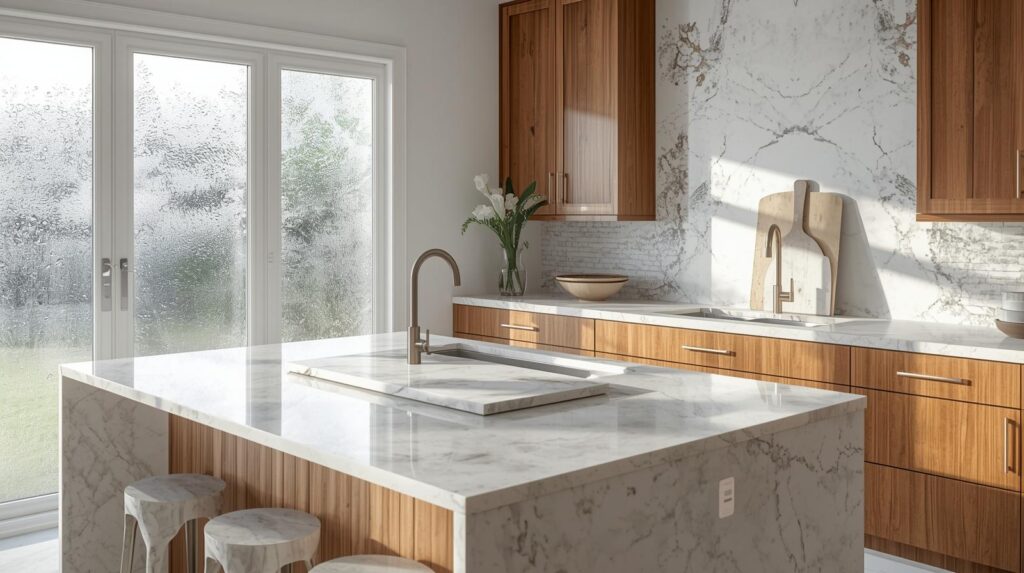Quartz and quartzite are the most reliable indoor choices for island humidity in the Bahamas, thanks to their low porosity and easy maintenance, while granite performs well with periodic sealing and marble offers premium beauty but needs the most care. The right pick depends on how you cook, your maintenance tolerance, and the look you want for Kitchen Countertops in Bahamas and Bathroom Countertops in Bahamas.
Why island humidity matters
High humidity and salt-laden air can penetrate porous stones, causing staining, micro‑pitting, and faster wear if surfaces aren’t sealed or maintained properly. Indoor kitchens and baths also face daily moisture, cosmetics, cleaners, and food acids that can etch softer stones, so choosing the right material prevents avoidable upkeep and early replacements.
Quick recommendations
- Choose quartz if you want the lowest maintenance, consistent patterns, and strong stain resistance for busy family kitchens and baths.
- Choose quartzite if you love a natural‑stone look with better hardness and lower porosity than many marbles, plus strong heat resistance.
- Choose granite if you want a time‑tested natural stone with varied patterns and solid durability, and you’re comfortable with regular sealing.
- Choose marble if you prioritize luxury veining and a classic look, and you’re prepared to protect surfaces from acids and seal more often.

Quartz vs Marble vs Granite vs Quartzite
Use this side‑by‑side guide to decide what fits your home, routine, and style in the Bahamas.
| Factor | Quartz | Marble | Granite | Quartzite |
| Composition | Engineered stone with resins | Metamorphic calcium carbonate | Igneous natural stone | Metamorphic sandstone recrystallized |
| Porosity | Very low | Higher | Low to medium | Low |
| Sealing | Typically not required | Required regularly | Recommended periodically | Recommended periodically |
| Stain resistance | High | Moderate to low | Moderate to high (sealed) | High (sealed) |
| Etching (acids) | Very resistant | Susceptible | Resistant | Resistant |
| Scratch resistance | High | Moderate | High | Very high |
| Heat tolerance | Good; use trivets | Good; use trivets | Very good | Very good |
| UV stability (indoors) | Stable indoors | Stable indoors | Stable indoors | Stable indoors |
| Maintenance | Easiest | Highest | Moderate | Moderate |
| Aesthetic | Uniform or subtle movement | Luxurious veining | Natural, varied patterns | Natural, marble‑like veining |
| Best rooms | Kitchens, baths, laundry | Low‑traffic baths, vanities | Kitchens, baths | Kitchens, baths, cooktops |
| Value over time | Strong | Style‑driven | Strong | Strong |
Kitchen use vs bathroom use
- Kitchen Countertops in Bahamas: Spills, oils, wine, citrus, and high traffic make quartz and quartzite ideal; granite performs well with sealing; marble needs care to avoid etches from acidic foods.
- Bathroom Countertops in Bahamas: Cosmetics, toothpaste, and skincare can stain or etch softer stones; quartz shines for vanities, while sealed granite and quartzite are robust options with a natural look.
Style guidance for Bahamian homes
- Coastal‑modern kitchens: Light quartz tones with subtle veining keep spaces bright and resist day‑to‑day wear.
- Classic island elegance: Quartzite or marble veining pairs beautifully with natural wood, warm whites, and brushed metal fixtures.
- Nature‑forward looks: Granite’s organic patterns complement tropical palettes and add visual depth to open plans.
Care and maintenance in humid climates
- Daily care: Wipe with a pH‑neutral cleaner and soft cloth; avoid harsh acids and abrasive pads to preserve finish.
- Sealing schedule: Marble should be sealed more frequently; granite and quartzite benefit from periodic sealing based on porosity and use.
- Spill protocol: Blot spills quickly, especially wine, oils, coffee, citrus, and cosmetics to prevent staining or etching.
- Heat and cutting: Use trivets and cutting boards on all materials to protect resins, sealers, and finishes.
- Ventilation: Good indoor airflow and dehumidification reduce moisture exposure and help countertops stay pristine longer.
Installation best practices
- Edge profiles: Rounded or beveled edges chip less than sharp profiles and are friendlier for family kitchens.
- Sink configuration: Undermount sinks look seamless; ensure proper sealing at the cutout to prevent moisture wicking.
- Backsplash protection: Full‑height stone or a sealed tile backsplash helps block humidity and splashes behind cooktops and sinks.
- Color selection: Lighter tones show fewer water spots and salt residue; matte finishes can hide micro‑wear but may require gentle cleaning.
- Professional templating: Accurate measurements and controlled seams reduce future moisture intrusion at joints.
Which material is right for you?
- Pick Quartz if you want a set‑and‑forget surface that resists stains and etching with minimal upkeep in busy, indoor island kitchens and baths.
- Pick Quartzite if you want the drama of natural veining with top‑tier hardness and excellent long‑term performance.
- Pick Granite if you value natural variation and are comfortable resealing to maintain protection in a humid climate.
- Pick Marble if the design statement is paramount and you’ll commit to careful use, sealing, and gentle cleaners.
Targeting your project goals
For lead‑time certainty, ask about locally available colors in quartz, select granites, and popular quartzites to minimize freight delays. For Kitchen Countertops in Bahamas and Bathroom Countertops in Bahamas, prioritize materials and finishes that match how you cook, clean, and entertain so your new surfaces look great season after season.
FAQs
Q1: Which countertop is best for indoor island humidity with minimal maintenance?
Quartz is the most hassle‑free for indoor Bahamas homes thanks to its low porosity and strong resistance to stains and etching.
Q2: Does granite hold up well in humid climates?
Yes, granite performs well indoors when sealed periodically, offering excellent heat and scratch resistance with a natural‑stone look.
Q3: Is marble a good idea for family kitchens?
Marble can be used, but it is prone to etching and staining; it’s better for lower‑traffic zones or homeowners committed to careful maintenance.
Q4: What’s the difference between quartz and quartzite?
Quartz is engineered and very low‑maintenance; quartzite is a natural stone that’s harder than many marbles, resists scratches, and benefits from periodic sealing.
Q5: How often should natural stone be sealed indoors?
Frequency depends on the stone and use, but many homeowners reseal granite and quartzite annually, while marble may need more frequent attention.
Ready to choose the right surface?
Get tailored advice, see in‑stock colors, and compare samples with a specialist who knows island conditions. Contact us for a free consultation: https://specialtykitchen.com/contact/


Recent Comments